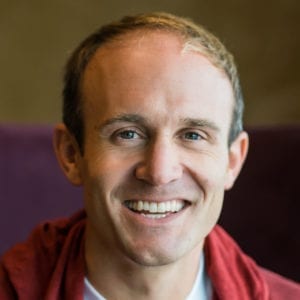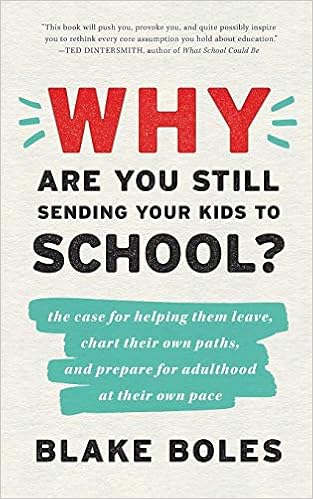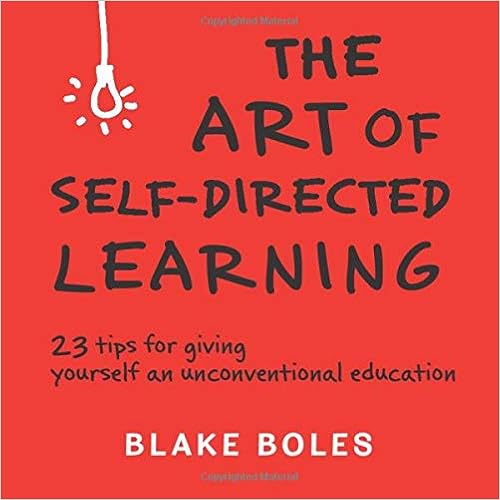
Blake Boles is the founder and director of Unschool Adventures, a company that gives self-directed teens and young adults—mostly unschoolers—an opportunity to explore cities all over the world.
Well-known for questioning our traditional approaches to schooling, Blake is a thought-provoking speaker, host of the Off-Trail Learning podcast, and author.
His books include The Art of Self-Directed Learning, Better Than College, College Without High School, and the recently published, Why Are You Still Sending Your Kids to School?.
In this episode of Leading Learning, Jeff talks with Blake about key concepts from his latest book related to alternative paths of education in K-12, a particularly relevant topic given the current disruption from the COVID-19 pandemic. They also discuss the importance of engagement, self-directed learning, and connection in young learners and how they inevitably impact adult learners.
To tune in, just click below. To make sure you catch all of the future episodes, be sure to subscribe by RSS, Apple Podcasts, Spotify, Stitcher Radio, iHeartRadio, PodBean, or any podcatcher service you may use (e.g., Overcast). And, if you like the podcast, be sure to give it a tweet!
Listen to the Show
Read the Show Notes
[00:18] – A preview of what will be covered in this episode where Jeff interviews Blake Boles, founder and director of Unschool Adventures and author of the recent, Why Are You Still Sending Your Kids to School?.
Reflection Question

[02:09] – You might consider the reflection question below on your own after listening to an episode, and/or you might pull the team together, using part or all of the podcast episode for a group discussion.
- What we would propose is maybe less of a reflection question and more of a challenge to shift your mindset as radically as you can manage. Blake points out some clear shortcomings of our traditional approach to elementary and secondary education and shows the value of very different approaches. What types of questions should we be raising about our traditional approach to adult lifelong learning? How might we radically re-think our approach?
[03:24] – Introduction to Blake and some additional information about his background and work.
Why Are You Still Sending Your Kids to School?
[06:20] – Tell us about more about your recent book, Why Are You Still Sending Your Kids to School?. What are you covering there, who is it aimed at, and what are you hoping to achieve by putting that question in front of people?
Blake shares that the book is for parents of school-aged kids who are clearly not thriving at school. He comes at this from the angle of boredom, engagement, and stress.
Essentially, if you see your kid is miserable or not engaged, highly bored, or disaffected in school, he challenges the assumption that you have to keep sending them to school just because that’s “the responsible thing to do”.
He clarifies that the book does not call for tearing down the public-school system or say that school doesn’t work for anyone, because it clearly does.
And he acknowledges that they serve very important roles in our society for other reasons.
This is just for that sliver of parents who realize school isn’t working for their kid and who are open to the possibility of an alternative.
However, when people think of alternatives they often think of homeschooling in the very traditional “school at home” sense.
Or they think of maybe Montessori or Waldorf schools, which he notes may be great for younger kids but mirror ritzy private schools once into the middle/high school range.
So this book champions the growing, largely private, largely decentralized network of alternative schools such as democratic-free schools (which might include Sudbury schools). And there are other things that are sometimes schools and sometimes not, like Agile Learning Centers or Liberated Learners centers.
In the book, Blake also talks a lot about homeschooling, which he describes as a big, diverse movement, not the stereotype that many of us grew up with, as well as the idea of “unschooling” (where much of his work is now focused).
To learn more, see Blake’s blog post “Agile Learning Centers, Liberated Learners, and Sudbury Schools: What’s the Difference?”
Homeschooling vs. Unschooling
[09:20] – Can you talk about the difference between homeschooling and unschooling?
Blake thinks about homeschooling as a legal definition and notes it became legal in all 50 states of the U.S. in the 90’s. He says it can mean many different things but there are many families who practice school at home.
And although sometimes these families are religiously motivated, that is no longer the number one reason reported to the National Center for Education Statistics. Rather, now there are other secular reasons that most parents choose to homeschool.
Blake explains that there’s a whole spectrum between conventional school at home and the highly self-directed, child-centered version of homeschooling—which is what unschooling is.
In the purest sense, unschooling means not giving your kid any curriculum at all. Not making any assumptions about milestones that they need to hit at certain ages, something he acknowledges can be very uncomfortable for parents.
Although some of it can be unsettling, there are students who really take advantage of this higher level of freedom and responsibility. And when they decide they’re ready to go to college or begin their careers, they rapidly gain the skills and background knowledge they need.
[11:09] – I think the ideas in this book can also be helpful to parents who aren’t pursing alternatives. It really makes you think about what the possibilities are and to pull back and look at how conventional schooling is going for your kid—and to maybe just relax a little bit and live the experience instead of living the stress and boredom often associated with conventional schooling. Have you gotten that feedback from people before that maybe they’re not going to go this alternative path, but they’re getting good lessons from this that apply anyway?
Blake notes that (as of the time of this recording), the book hasn’t even been out a week, so his feedback is limited.
But he is hoping that this becomes the go-to book to hand to the parents of kids who aren’t having a good experience with school.
He describes the book as a nondogmatic, gentle introduction to these ideas that provides a sense of possibilities.
And it also hits on related areas like the parenting research and the topic of higher education, because he says all of those subjects are intertwined with the choice of taking an alternative path through K-12.
Engagement, Boredom, and Stress
[13:10] – You already mentioned the idea of engagement, boredom, and stress. One of the first lightbulbs that went off in my head as I was reading your book was particularly around engagement. In this whole world of adult professional development, continuing education, and lifelong learning, one of the issues that comes up again and again is engagement and how we create engaging experiences for our learners—or if our learners aren’t engaged, what do we do about it? This made me realize that this starts so early. Can you talk a bit more about your diagnosis of those issues (engagement, boredom, and stress)? And where are we falling short in our schools right now?
Blake admits that when we talk about engagement with adults—to the extent that someone can be engaged with their work—it’s limited by the kind of work available by the economy.
So this is something that’s changing as the field of work is changing also.
With young people, he thinks we are just way behind the curve.
When people wonder how they will know if school is working for their kid or not, Blake thinks engagement is the number one metric to use. And he notes you don’t have to be a social scientist to figure out if your kid is engaged or not.
Blake discusses how summer camps are a great example of places where you have very high engagement levels among kids. And fundamentally, summer camps, like extracurriculars, are voluntary.
So to a large extent, school is not going to be an engaging place for kids because it’s simply not voluntary. And he says that’s the large barrier and why he champions these alternatives where they give kids as much choice and autonomy as reasonable.
Blake asserts that engaged young people have a much higher chance of becoming engaged adults (limited by the economic opportunities available to them as adults).
If a young person has a chance to exercise their sense of intrinsic motivation, to feel a sense of control, to develop a sense of mastery, they are much more likely to gravitate towards work as adults where they are more engaged.
Self-Directed Learning
[16:35] – Self-directed learning is another element you stress a lot—and you’ve written The Art of Self-Directed Learning. You noted that’s particularly a priority in unschooling. But really throughout all of the alternative forms of education—and really it should be a part of conventional and formal education as well—is having that sense of self direction. How do you help to uncover/cultivate that and ensure that self-direction is going to be there, particularly if you’re going to do the unschooling thing? Do you find that people are naturally self-directed if you can just find the right direction for them to point in? Or does it take a little coaching
Blake does think it’s a fairly natural drive and that you’d be hard pressed to find a kid who is never motivated to do anything on their own.
But yes, he says it does require some coaching, support, and a certain level of privilege.
Kids who are going to become full-time self-directed learners do require rich environments where they’re surrounded by caring adults (parental and non-parental), ideally a good peer group, and the necessary resources.
Within such an environment, all Blake says a parent needs to do is to let go of the reigns.
An analogy he likes to use (taken from The Self-Driven Child: The Science and Sense of Giving Your Kids More Control Over Their Lives) is a parent needs to think of herself more as a consultant to her kid, instead of the boss or manager of her kid’s education.
Offer opinions, guidance, suggested resources and the kid can decide whether to take the advice or not. Blake says it’s their business, which is just acknowledging that it’s their life not yours.
And there’s a certain level of detachment which makes it easier to digest when you are dealing with adolescence rather than younger kids.
You just have to get out of the way and provide a rich, loving environment for your kid in order to help them be self-directed.
The Purpose of Education and School
[19:34] – What do you feel the purpose of both education and school is?
Regarding education, Blake admits it’s hard to try and pin down. But he cites his intellectual hero, John Taylor Gatto who said an education is something that makes you an individual, it teaches you how to live and how to die.
Regarding the purpose of school (for very basic elementary skills), Blake talks about the history and how our system of middle and high schools developed, only about a hundred years ago.
So we just created a lot of work (literally made up work) for kids, which to some extent he says is important to help prepare them for more of the knowledge work type stuff in our economy.
But to another large extent, it’s not that important. And kids can detect that school is just sort of a holding chamber.
Also, it serves a very important function as a collectively funded childcare service, something we’ve seen during the pandemic.
Blake points out how this purpose has been magnified as most parents’ main concern is who is going to watch their kids so they can go back to work. And this should tell us a lot about one of the fundamental reasons that school exists, which is not the same thing as education.
Jeff notes that in order to rethink school, you need to rethink work too.
The Value of College
[23:40] – You make the point in the book that schooling tends to be—particularly as you advance—a form of job signaling. So what’s your take on the value of college (in general and at this point in history)?
Blake attacks the issue of college from two different perspectives in the book.
Initially he looks at the research related to how the alternatively educated kids do in college. And it shows that they do just as good (not really better or worse) as kids from similar backgrounds.
But then he revisits the question of college later in the book where he compares college to a secular religion—something we’ve all chosen to believe in as a sort of rite of passage as an economic gateway, especially for young people who would be the first to ever go to college in their families.
So we’ve all agreed that college is wonderful, both for making more money and also for the enlightenment reasons.
He bounces back between the economic return on investment argument and also on how to develop the life of the mind to become a real critical thinker.
Blake doesn’t try to say that college is right for everyone or wrong for everyone. In fact, he himself had a very enlightening, ideal college experience.
There are a few books he references that have been recently published and have done a great job analyzing this, such as The Case against Education: Why the Education System Is a Waste of Time and Money by Bryan Caplan.
This book takes the deepest dive he’s seen into what the return on investment is for young people going to college today in the U.S.
For some, it’s definitely a great investment and payoff. But it’s the kids you’d expect to do really well in college in the first place. Those who have gravitated towards academics for a long time.
But for all these other kids, the ones who are more likely to go to college for the wrong reasons and probably don’t finish their degree, still leave with unforgiving student loan debt. And Blake says that’s a truly bad – and perhaps negative – economic investment to make.
He looks at where else someone ages 18-22 is going to learn to think really critically and where they could go to be with a group of peers and adults/professors who are going to challenge them.
Blake concludes that the ideal college student is the one who is making a highly informed choice and is very intrinsically motivated to go.
They’re not just following a tidal wave of anxious 18-year-olds and their even more anxious parents who think college is the only way to succeed. And that they have to go right now even if they’re burnt out and not ready.
The simple fact that we will let these burnt-out teenagers go straight into college and take on student loan debt at age 18—when a comparable amount of debt on their personal credit cards would be seen as obscene—that in itself is an obscene thing that we are doing today.
The Importance of Connection
[28:47] – You end the book talking about the need for connection. Can you talk a little more about that focus on connection and why that’s important in how you think about all of this?
Blake agrees that connection as a young person really carries over into your sense of connection as an adult. And fundamentally the period of formal education is quite short within a person’s life, so we want to set them up for success as adults.
He recognizes that connection means a lot of different things to different people and admits he never even used the term until his experience working at a camp in his early 20’s.
What helped him really understand what was meant by connection was the book, Lost Connections by Johann Hari.
Hari talks about the many different flavors of connection that really relate to the higher levels of Maslow’s hierarchy of needs.
The reason Blake has this in the last chapter of his book is because it really ties together everything that’s lacking from so many kids’ school experiences.
They don’t feel like their work is meaningful. They don’t feel like they have significant opportunity to make interpersonal connections because it’s so constrained by the school schedule. There’s not much access to the natural world. And then thinking about having a hopeful or secure future, or feeling status and respect, Blake says those are both questionable as well.
We need to give kids a positive taste for these connections because these are such formative years. And if we accustom kids to feeling like nothing really matters—their work isn’t going to be seen by anyone or nobody will care—and they aren’t able to form genuine friendships with other people, Blake says that’s just a bad thing to put a young person through. And it will condition them for how they’re going to think about life as an adult.
Even though connection is a messy concept, he stresses that it’s vitally important and something that teenagers especially look for.
[34:25] – What is one of the most powerful learning experiences you’ve been involved in, as an adult, since finishing your formal education?
Blake shares about his experience attending a wilderness camp (and then ultimately working there) where he got to go on lots of the advanced backpacking trips offered.
One in particular – called the “Ascent” – is where a group of teenagers plan every detail of the entire trip. He and another instructor followed the group just to be their shadows but not to interact with them unless anything went wrong.
He talks about how the teens forgot the pot to cook their dinner in and he didn’t allow them to use his because he was supposed to act like he wasn’t there. They ate less desirable food for dinner, but this taught them, in that momentary discomfort, a lesson they wouldn’t likely forget.
This was also a huge learning experience for Blake and he ended up designing the way he leads international travel programs for teenagers around that same concept of the Ascent trip.
[38:27] – How to connect with Blake and/or learn more:
Website: https://www.blakeboles.com/
[38:51] – Wrap-Up
Reflection Questions

- What types of questions should we be raising about our traditional approach to adult lifelong learning? How might we radically re-think our approach?
If you are getting value from the Leading Learning podcast, be sure to subscribe by RSS, Apple Podcasts, Spotify, Stitcher Radio, iHeartRadio, PodBean, or any podcatcher service you may use (e.g., Overcast) as it helps us get some data on the impact of what we’re doing.
We’d also appreciate if you give us a rating on Apple Podcasts by going to https://www.leadinglearning.com/apple. We personally appreciate your rating and review, but more importantly reviews and ratings play a big role in helping the podcast show up when people search for content on leading a learning business.
Finally, consider following us and sharing the good word about Leading Learning. You can find us on Twitter, Facebook, and LinkedIn. We also encourage you to use the hashtag #leadinglearning on each of those channels. However you do it, please do follow us and help spread the word about Leading Learning.
[40:36] – Sign off
See Also:



 Transactional to Transformational with Micène Fontaine
Transactional to Transformational with Micène Fontaine
Leave a Reply